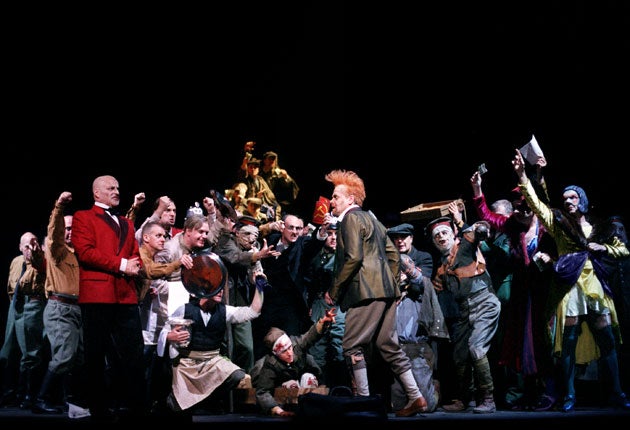Glyndebourne attracts the Glastonbury crowd
Cut-price tickets and special deals for the under-30s are persuading more and more young music lovers to sample opera

Opera. The very word summons images of fat ladies singing and even fatter gents in formal wear. But on stage and off, the art form with its roots in the 16th century is becoming popular among music lovers aged closer to 16 than 60.
As the Glyndebourne Festival gets under way in East Sussex next Saturday, companies are throwing off the genre's fusty, elitist image and attracting more twenty-somethings with cut-price tickets and innovative schemes to broaden opera's appeal.
Glyndebourne is enjoying record box office sales, up 8 per cent on the same time last year. David Pickard, its general director, said this was not only a reflection of its loyal membership but also initiatives to find new audiences, including subsidised tickets for under 30s, family days and an online notification service for ticket returns. Glyndebourne also reaches a wider audience by screening productions in cinemas.
Thirty per cent of English National Opera's audience are now under 44, up from 21 per cent five years ago. The company won a Royal Philharmonic Society Music Award this week for its audience development. It has a longstanding world-class reputation for contemporary work, but its imaginative collaborations – including last summer's sell-out of John Webster's The Duchess of Malfi with the theatre company Punchdrunk – are luring a younger crowd. And its Access all Arias discount ticket scheme for under 30s and full-time students is the biggest of its kind in Europe.
John Berry, artistic director of ENO, which unveils its new programme on Tuesday, said: "A lot of audiences in international houses are getting older, so I think it's absolutely down to the programme, down to the work and how you connect with the audience through social networking and digital initiatives.
"I dare say there will be some more conservative audiences that don't come any more. What is interesting is, when you look at our core audience and people who book for seven or eight things a season, they are booking for contemporary events and the kind of work they can't see elsewhere. The days of La Traviata and La Bohème just selling out are over really."
Yet it is well-known operas, such as La Bohème and Carmen, which are enticing younger people to Opera North in Leeds. It has seen a 5 per cent rise in the number of under-26s watching its productions – thanks, in part, to an increased online presence that includes a blog, podcasts and social networking sites. The company enjoyed an 11.5 per cent boost in total attendance in 2009/10 compared with the previous year.
Helen Ireland, director of marketing for Scottish Opera, which has seen the number of under-26s watching its productions grow 27 per cent year-on-year, said companies had to work harder to attract new audiences because classical music does not feature in people's lives in the same way it had for many older opera fans. But she said that television shows such as Britain's Got Talent, won by opera singer Paul Potts in 2007, contributed to "an environment in which people think opera is something that they might enjoy".
Popstar to Operastar returns to ITV next month, with celebrity singers including Midge Ure and 2009 X Factor winner Joe McElderry tackling the genre for the first time. Myleene Klass, the show's presenter, believes opera is seeing a resurgence because the excess of talent shows means people now look to "extraordinary talent".
"The technique alone and sheer wall of sound that operatic performers can achieve often defies belief," she said. "The theatrics and make-up are worthy of Lady Gaga and the drama makes EastEnders look tame. It's essential to make opera and classical music in general accessible to keep it alive. The purists sadly don't always recognise this and view it as dumbing down – and yet it was the popular music of its time.
"Rappers like Jay-Z and Eminem recognise its [opera's] power and sample it constantly."
Companies are also engaging kids. The Royal Opera House's Youth Opera Company – 39 children aged nine to 12 – will sing in public for the first time next weekend. English Touring Opera is coming to the end of its first full-scale tour of a family opera, Fantastic Mr Fox, for which 40 per cent of the audience were children.
Yet despite all the development work, a Department for Culture, Media and Sport survey found only 1.9 per cent of 16- to 24-year-olds – and 3.2 per cent of 25- to 44-year-olds – attended an opera or operetta in 2009/10. Robin Norton-Hale, of the Olivier Award-winning company OperaUpClose, warned that opera's "image as elitist and not for everyone" still lingers.
Join our commenting forum
Join thought-provoking conversations, follow other Independent readers and see their replies
Comments
Bookmark popover
Removed from bookmarks